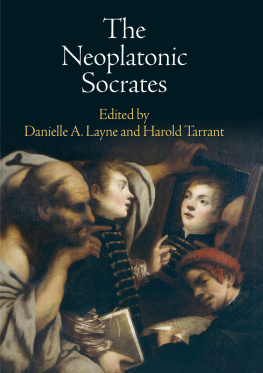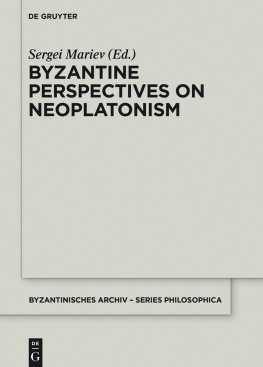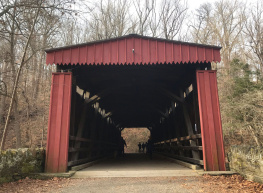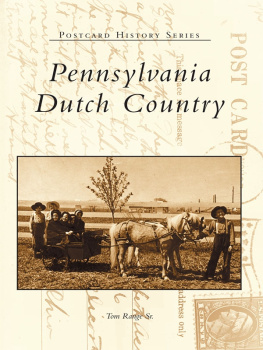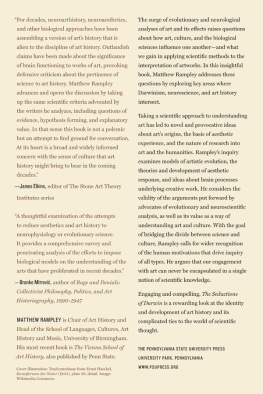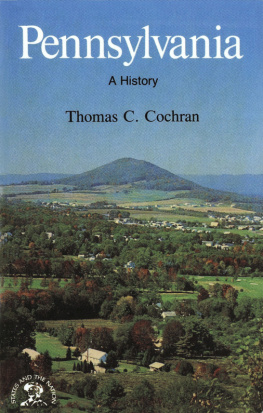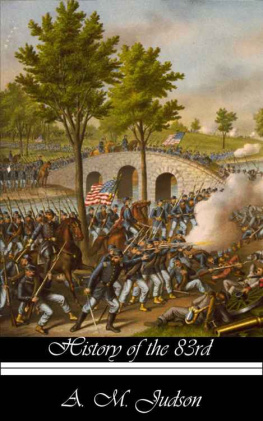University of Pennsylvania. - The neoplatonic Soctatesł
Here you can read online University of Pennsylvania. - The neoplatonic Soctatesł full text of the book (entire story) in english for free. Download pdf and epub, get meaning, cover and reviews about this ebook. City: Philadelphia, year: 2014;2019, publisher: University of Pennsylvania Press, genre: Science. Description of the work, (preface) as well as reviews are available. Best literature library LitArk.com created for fans of good reading and offers a wide selection of genres:
Romance novel
Science fiction
Adventure
Detective
Science
History
Home and family
Prose
Art
Politics
Computer
Non-fiction
Religion
Business
Children
Humor
Choose a favorite category and find really read worthwhile books. Enjoy immersion in the world of imagination, feel the emotions of the characters or learn something new for yourself, make an fascinating discovery.
- Book:The neoplatonic Soctatesł
- Author:
- Publisher:University of Pennsylvania Press
- Genre:
- Year:2014;2019
- City:Philadelphia
- Rating:5 / 5
- Favourites:Add to favourites
- Your mark:
- 100
- 1
- 2
- 3
- 4
- 5
The neoplatonic Soctatesł: summary, description and annotation
We offer to read an annotation, description, summary or preface (depends on what the author of the book "The neoplatonic Soctatesł" wrote himself). If you haven't found the necessary information about the book — write in the comments, we will try to find it.
The neoplatonic Soctatesł — read online for free the complete book (whole text) full work
Below is the text of the book, divided by pages. System saving the place of the last page read, allows you to conveniently read the book "The neoplatonic Soctatesł" online for free, without having to search again every time where you left off. Put a bookmark, and you can go to the page where you finished reading at any time.
Font size:
Interval:
Bookmark:

THE NEOPLATONIC SOCRATES
THE NEOPLATONIC
SOCRATES

EDITED BY
Danielle A. Layne and Harold Tarrant

UNIVERSITY OF PENNSYLVANIA PRESS
PHILADELPHIA
Copyright 2014 University of Pennsylvania Press
All rights reserved. Except for brief quotations used for purposes of review or scholarly citation, none of this book may be reproduced in any form by any means without written permission from the publisher.
Published by
University of Pennsylvania Press
Philadelphia, Pennsylvania 19104-4112
www.upenn.edu/pennpress
Printed in the United States of America on acid-free paper
10 9 8 7 6 5 4 3 2 1
A Cataloging-in-Publication record is available from the Library of Congress
ISBN 978-0-8122-4629-2
CONTENTS

Danielle A. Layne and Harold Tarrant
Geert Roskam
John F. Finamore
Crystal Addey
Christina-Panagiota Manolea
Danielle A. Layne
Michael Griffin
James M. Ambury
Franois Renaud
Marilynn Lawrence
Harold Tarrant
Danielle A. Layne and Harold Tarrant
INTRODUCTION

Danielle A. Layne and Harold Tarrant
Or how, before this, could we examine anything else, either of the things that are or of those that come to be when we have heard Socrates himself say: It seems ridiculous of me to consider the properties of other beings, when I do not know myself?
Proclus, in Alc. 6.12 (tr. ONeill, modified)
In one of the most romantic dialogues of his corpus, Plato depicts Socrates walking barefoot in the waters of the Ilissus, coyly tormented by a seemingly benign conundrum: Who am I, and what are my intentions? Turning to the handsome Phaedrus and admitting his real difficulty with his lack of self-knowledge, Socrates famously wonders whether he resembles a monster more complicated and more furious than Typhon or a gentler and simpler creature, to whom a divine and quiet lot is given by nature. Unable to solve the problem immediately, Socrates spends the afternoon conversing with the boy on the nature of love, the soul, and the life of the philosopher and, in so doing, sets the question Who is Socrates? on the back burner. Yet, as we all know, years later, in a setting dramatically different from this meandering stroll on a hot summer day, this very same difficulty was readdressed before his peers and countrymen, the Athenians, and they replied rather forcefully, sentencing the philosopher to death for corrupting the youth.
As history testifies, the Athenians were not the last to respond indignantly to the question Who is Socrates? Timon of Phlius, skeptic and disciple of Pyrrho, apparently believed that Socrates was a wicked dissembler, while Cato, the Roman statesman and Stoic, deemed him a seditious babbler.
Patently, opinion on Who is Socrates? and whether he was a Typhonic monster or a sage has been decidedly split. In contemporary scholarship on Socrates this question has been revived and comprehensively analyzed. In fact, the library stacks of most research universities testify to the wealth and abundance of secondary literature on Socrates, and, like well-worn war trenches, the daunting material in the field can overwhelm and perhaps even frustrate students. In Socratic studies alone, the army of topics includes questions concerning the sufficiency of virtue for happiness, the necessity of knowledge for the good life, the sincerity or irony of Socrates avowals of ignorance, the (im)possible nature of akratic action, Socratic method, and, most prominently, the so-called Socratic problem in which scholars debate the possibility of discovering the thoughts and beliefs of the historical Socrates.
Assuredly, one of the most important texts in Socratic studies is Gregory Vlastoss Socrates: Ironist and Moral Philosopher. Written at the end of a long and industrious career in ancient philosophy, this book marked the beginning of a radical resurgence in Socratic philosophy as Vlastos advanced many remarkable and provocative theses that attempted to wrestle with and uncover the historical Socrates. Inspired by Vlastoss pioneering work, in the early 1990s several editions and monographs devoted to understanding the life and work of the philosopher began to appear, expanding the already abundant repertoire of appraisals on Socrates in Platos dialogues. Consequently, many interested students hoping to come to grips with the infamous question Who is Socrates? began turning to editions like Hugh Bensons Essays on the Philosophy of Socrates, K. J. Boudouriss Philosophy of Socrates, and William Priors four-volume Socrates: Critical Assessments to navigate a path through this overloaded terrain of scholarship. These volumes offered students and scholars a rich compendium of essays devoted to various issues, not the least of which was responding to the Socratic problem and the search for the true Socrates, that is, the historical answer to the question Who is Socrates?.
In the mid-nineties the quest for the so-called historical or true Socrates began to wane as specialists slowly forged the consensus that headway on the subject would not be possible without further evidence. In fact, many scholars voiced the opinion that the Socratic problem was a chimera, a Typhonic monster itself, as the literary genre that both Plato and Xenophon so eloquently employed, the logoi sokratikoi, allowed for considerable liberty and creativity, and thus neither of these authors could reliably be deemed the authentic voice of the historical Socrates. One need only think of Paul Vander Waerdts edited volume The Socratic Movement, which, after examining Platos and Xenophanes depictions of Socrates, also included essays devoted to the philosophers influence on the Cynics, Stoics, and Skeptics. In fact, in recent years there has been a remarkable surge of scholarship that explicitly endeavors to track the history of the Socratic commentary inaugurated in the Academy and surviving into the present age. For instance, Lindsay Judson and Vassilis Karasmanis compiled a collection entitled Remembering Socrates, whose final two essays explicitly deal at length with the appearance of Socrates in later antiquity. Similarly, Donald R. Morrison opens his Cambridge Companion to Socrates with a very dense essay by Louis-Andr Dorion on the decline of interest in the Socratic problem, but also brilliantly ends with a piece by A. A. Long entirely devoted to Socrates in the Hellenistic and imperial ages. Continuing this trend, Michael Trapps two-volume Socrates from Antiquity to the Enlightenment and Socrates in the Nineteenth and Twentieth Centuries meticulously devotes itself to tracing the image of Socrates throughout the history of philosophy and even concludes with essays on Kierkegaards and Nietzsches attraction to this Athenian personality. Finally, one of the best publications aiming to give its readers a more comprehensive answer to the question Who is Socrates? is Sara Ahbel-Rappes and Rachana Kamtekars Companion to Socrates, which dedicates almost half of its 510 pages to the Socrates envisaged by later thinkers in the medieval, Renaissance, modern, and contemporary periods. In this volume essays range over a variety of topics, including analysis of typical Socratic problems in Platos dialogues, as well as more creative and stimulating theses like Socrates sage-like status in the Arabic tradition and his methodological impact on Hegel. It closes with persuasive discussions concerning the philosophers influence on contemporary teaching methods and even psychoanalysis.
Font size:
Interval:
Bookmark:
Similar books «The neoplatonic Soctatesł»
Look at similar books to The neoplatonic Soctatesł. We have selected literature similar in name and meaning in the hope of providing readers with more options to find new, interesting, not yet read works.
Discussion, reviews of the book The neoplatonic Soctatesł and just readers' own opinions. Leave your comments, write what you think about the work, its meaning or the main characters. Specify what exactly you liked and what you didn't like, and why you think so.

